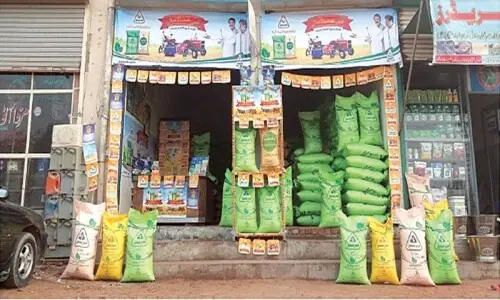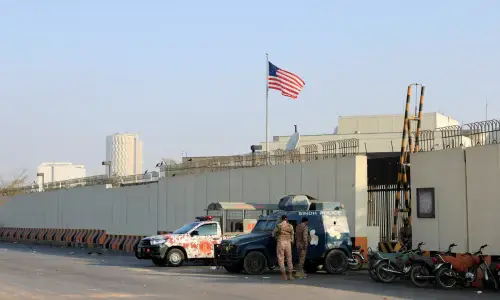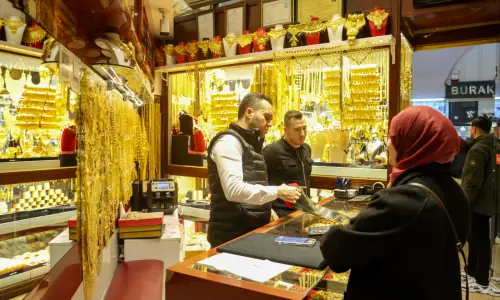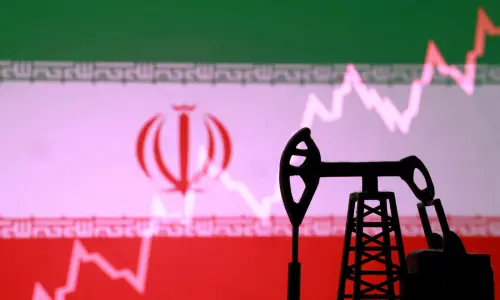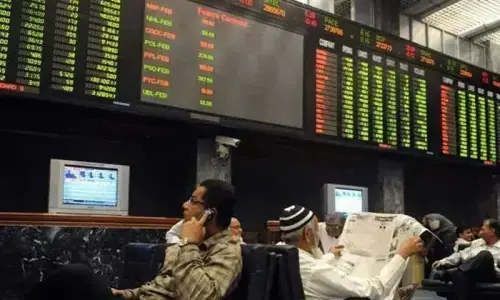From the mid-1970s onwards, Pakistanis, for the first time, were given the opportunity to travel to various oil-rich Arab countries for work. Until then, very few Pakistanis actually possessed passports and had to go through a tiresome and expensive procedure to get one.
In 1974 the populist government of ZA Bhutto drastically relaxed the procedure when the opportunity arrived to ship out hordes of Pakistanis to the then rapidly developing oil-rich Arab countries.
These countries needed cheap labour to construct their bridges, roads, hotels and office complexes and skilled professionals in the fields of medicine, teaching, hoteling, engineering and aviation.
The Pakistanis who began to make there way to countries like Saudi Arabia, the UAE and Libya largely belonged to the working class and lower-middle-class sections of the country.
 |
| A PIA plane brings one of the first major waves of Pakistani workers to Dubai in 1974. This was how small the Dubai airport was then. Today, it is one of the largest and busiest in the world. |
In Arab countries the Pakistanis came into contact with the strand of faith practiced by the Arabs and encouraged by their monarchs.
When most Pakistanis came into contact with their Arab employers, they were initially disoriented by what they saw to be a somewhat dry and non-spiritual strand of the shared faith. They became even more perturbed when their beliefs were ridiculed and they were asked to mend them (by their Arab employers).
Also read: Merchants of faith
Never before had the Pakistani working and middle-class folk managed to make the kind of money that they began to make in those strange, spiritually dry but rich lands of the limousine-driving Bedouins.
However, more than these Pakistanis being persuaded to give up their old, folksy version of the faith and take up what their Arab paymasters insisted was ‘true faith,’ it was the money that these Pakistanis began to make and the sudden rise in their social status back home, is what convinced them to shed their old beliefs.
After all, the old beliefs now reminded them of days that may have been more open-ended and flamboyant, but these were also days when they struggled to own their own TV set, freezer, air-conditioning unit and refrigerator.
In other words, the shedding of folk traditions and the adoption of a dryer strain of the faith also became a kind of a badge exhibiting a person’s enhanced economic status and social standing.
 |
| A screen shot from the 1979 Pakistani film, Dubai Chalo (Let's Go To Dubai). The hit film satirised the mad rush of Pakistanis to Dubai and the consequent change in their life styles and beliefs. |
This was a widespread social phenomenon that went beyond the confines of just religious events.
For example, till the late 1970s, cinemas had played a crucial role in bringing together men and women of all classes to share a common experience.
There was regular interaction between these classes elsewhere as well. On the beaches, during sports events and at recreational parks.
But from 1980 onwards invisible walls began to spring up. The reasons were largely economic, but they increasingly began to be demonstrated and expressed on the basis of faith, sect, sub-sect and ethnicity.
The urban middle-classes seemed to have had collapsed inwards. The arrival of the VCR symbolised this perfectly because now, one did not have to go to a cinema and stand in the line with the unwashed lot to watch a film that (during the Zia regime) would anyway be butchered by the censors.
So the film industry began to wither, cinemas began to be converted into gaudy shopping plazas, and separate recreational outlets began to spring up to cater to different classes.
The gradual social inwards projection boded well with the changing religious trajectory of the society. The age of flamboyant social extroversion and political populism was coming to an end in Pakistan.
One of the first Islamic evangelical groups to benefit the most from this trend was the apolitical Tableeghi Jamat (TJ).
The strand of Islam that the likes of the Tableeghi Jamat (TJ) and the Zia regime began to advocate was not very forbearing.
For instance, if a son of a family joined the TJ he would have to eventually bring the rest of the family into the fold as well.
Failing to do so could mean domestic friction and tension. So, for the sake of keeping the family together, everybody would join in, whether they liked it or not.
In 1981, one of my favorite cousins, Khalid (who was four years older than me), joined the TJ. Most Parachas of Karachi and the Punjab were gradually moving away from their folksy faith roots.
 |
The nature of the new money that began to pour into Pakistan from the pockets of those who had worked in or were still working in oil-rich Arab countries came with an undeclared condition: This money will only benefit you if you mend your distorted religious beliefs.
Since society was becoming polarised into groups that would prefer to only interact with their own kind, pragmatism demanded that one (even superficially) adopt the strand of the faith of those with money to spend and invest.
My clan, the Parachas, have for long been one of the leading traders of tea.
Much of this tea was being imported by them from Kenya. So the story goes that in 1979 some influential Paracha tea traders, while on a rudimentary business trip to the Kenyan capital, Nairobi, noticed that their main Kenyan contact there had become an ardent follower of a group of TJ members who had travelled to Kenya from Pakistan.
The contact was an important one, so some Paracha tea traders also joined the TJ.
They changed their attire and look the way the TJ required them to.
They stood out in the main tea market in Karachi. In no time a boom in the tea trade was accompanied by a boom in the Paracha clan joining the TJ.
Also read: Trading faith
By 1979, Khalid's father had begun to wind up his agricultural interests in the Punjab and had moved to Karachi to join the booming tea business.
Both of his sons plunged into the business and Khalid was convinced by the TJ Parachas in the market to join the outfit.
Two things contributed to his joining the group. First, of course, was the fact that to be accepted as a fellow tea trader one had to have the kind of religious inclinations now adopted and proudly exhibited by his fellow (and more influential) traders in the market.
Secondly, Khalid seemed to have been caught between a life of an agriculturalist in the Punjab and a life of a jeans and T-Shirt wearing film and cricket enthusiast in Karachi.
When in the 1970s he used to come and stay with us in Karachi, in hindsight I can now picture him trying to search for a concrete identifying singularity as he moved from meeting my traditionalist and folksy paternal grandparents, to my PPP-loving father, all the way to my young, free-wheeling uncles (my father’s brothers).
I guess he thought he had found that singularity, an anchor and an identity when he joined the TJ. His father's wife almost immediately endorsed her younger son’s new religious vocation. So did his sister who was married off into another Paracha family that had already been smitten by the TJ.
The eldest son hung around for a while outside the TJ influence, but then so did his father.
But the pressure to convert was just too strong. Business demanded it and so did family relationships. Though Khalid's father never joined the TJ as such, he did agree to throw out the TV and renounce his past.
 |
| A group of young TJ members. |
I was 15 when Khalid joined the TJ in 1981. And so did I. For a while.
I hung around for almost a year but eventually bailed out. I guess I was still attached to the folksy strands of the faith that my grandparents had infused in me and that included regular visitations to the shrines of Sufi saints.
Also, by the time I was 16, I had already become interested in ideas like Marxism that were ironically paralleled by my growing enthusiasm for musical genres such as the Qawali and rock music.
Instinctively, I knew my spiritual, social and political destiny lay somewhere else. And, I wanted to dress sharp too!
As more and more Parachas became conservative and overtly religious, the Paracha history went through a radical rewrite.
A book appeared in 1981 by one Fida Paracha. In it he traced the Paracha clan’s history all the way back to Yemen where (according to him) one Ali Yamani who converted to Islam in the 7th Century was the common ancestor of all Parachas.
Of course, this was revisionist nonsense, but with religiosity steadily becoming a lucrative political and economic tool during the Zia era, the new history was mighty appealing to most Parachas.
Suddenly, my female cousins with whom I had grown up were not allowed to come in front of me without a burqa. I haven’t seen any of them for over 30 years now.
Though my grandparents were very religious as well and had scaled down their traditionalist activity, they refused to submit to the new puritanical dictates of their clan contemporaries.
But Khalid's father too never submitted fully to the dictates of the TJ. And it showed.
I always believed that the guy was playing a convoluted role of a puritanical man just to keep his family from falling apart. First business had demanded this of him and then marital relations between their families and those of his son’s wives and their daughter’s husband demanded it.
 |
| Hairy days 1989: By now I had realised my spiritual and ideological destiny lay somewhere else. |
In October 2009 when my father passed away, I met Khalid's father after a long time. I was delighted to see him.
He wasn’t speaking Punjabi or Urdu in the false Arabic accent that most TJ members tend to, nor did he have any religious advice for me.
After we had returned from the graveyard where we buried my father, I strolled just outside my father's house for a quiet moment and a smoke. Just as I had lit myself a cigarette, someone tapped me on the shoulder.
I turned around and it was Mama. Looking left and right (as if to see whether his sons were in the vicinity or not), he asked if I had a spare cigarette.
‘But what about the heart?’ I asked him (in Punjabi). He had a heart condition.
‘Leave my heart to me,’ he replied, extending his hand for the cigarette.
I lit one for him and handed it over.
‘Your family will be angry with me,’ I smiled.
‘Let them!’ He laughed, almost like a naughty kid.
Yes, this was the guy without his thick puritanical coating interacting with someone who did not demand any particular religious conviction or exhibition from him.
Like the old days, when interacting with people one loved was fun and connecting with the Almighty even more.











